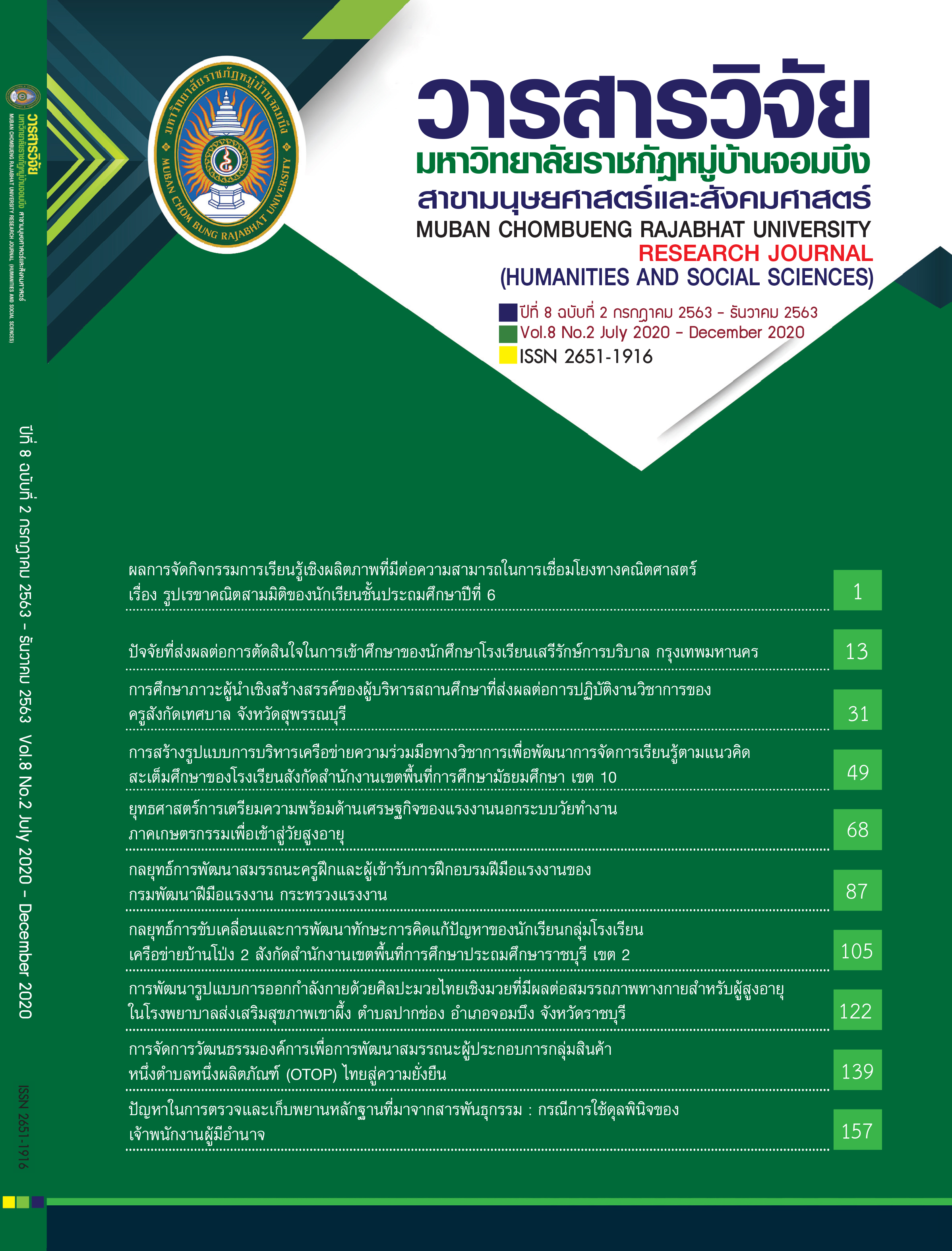ปัญหาในการตรวจและเก็บพยานหลักฐานที่มาจากสารพันธุกรรม : กรณีการใช้ดุลพินิจของเจ้าพนักงานผู้มีอำนาจ
คำสำคัญ:
นิติวิทยาศาสตร์ , สารพันธุกรรม , ดุลพินิจบทคัดย่อ
การนำเทคโนโลยีวิทยาศาสตร์มาช่วยในกระบวนการยุติธรรมทางอาญา โดยเฉพาะการนำสารพันธุกรรมในร่างกายมาประยุกต์ใช้ในการแสวงหาพยานหลักฐาน ถูกยอมรับจากทั่วมุมโลกว่า สามารถช่วยคลี่คลายคดีอาญาที่เกิดขึ้นได้อย่างแท้จริง เพราะมีความแม่นยำน่าเชื่อถือและมีประสิทธิภาพมากที่สุดหากเทียบกับพยานหลักฐานชนิดอื่นๆ จะเห็นได้จากคดีที่มักขาดประจักษ์พยาน แม้การนำสารพันธุกรรมมาใช้ในกระบวนการยุติธรรมทางอาญาจะมีประโยชน์มากเพียงใดก็ตาม แต่อาจส่งผลกระทบต่อศักดิ์ศรีความเป็นมนุษย์ได้ อันเนื่องมาจากวิธีการได้มาของสารพันธุกรรมจะต้องทำการล่วงล้ำเข้าไปในเนื้อตัวร่างกายของบุคคล ซึ่งถือเป็นการละเมิดต่อสิทธิอย่างหนึ่งที่ต้องได้รับความคุ้มครอง ดังนั้น แต่ละประเทศจะต้องออกกฎหมายเพื่อกำหนดขอบเขตการใช้อำนาจของเจ้าพนักงานในการสั่งตรวจและเก็บสารพันธุกรรมมิให้กระทบต่อศักดิ์ศรีความเป็นมนุษย์ของพลเมืองในประเทศ โดยคำนึงถึงหลักสิทธิมนุษยชนควบคู่ไปกับประโยชน์ต่อการอำนวยความยุติธรรมของคนหมู่มากเป็นสำคัญ ซึ่งแม้ว่าในประเทศไทยจะมีการกำหนดหลักเกณฑ์ในการแสวงหาพยานหลักฐานจากสารพันธุกรรมแล้ว แต่ยังคงพบว่ามีข้อบกพร่องอยู่ เห็นได้จากกรณีตัวอย่างในประเด็นปัญหาเรื่องการใช้ดุลพินิจของเจ้าพนักงานสอบสวน ที่ในปัจจุบันยังไม่มีมาตรการทางกฎหมายในการตรวจสอบและกำหนดขอบเขตการสั่งตรวจและเก็บตัวอย่างสารพันธุกรรมที่ชัดเจน จึงอาจนำไปสู่ปัญหาที่เจ้าพนักงานสอบสวนใช้อำนาจตามกฎหมายเพื่อแสวงหาประโยชน์โดยมิชอบ ทั้งนี้ หากจะทำการแก้ไขเพิ่มเติมบทบัญญัติในเรื่องดังกล่าว จะต้องทำการศึกษาจากหลักเกณฑ์วิธีการของต่างประเทศควบคู่ไปกับหลักการคุ้มครองสิทธิ
เอกสารอ้างอิง
2. ฉัตรไชย จันทร์พรายศร. (2559). หลักสิทธิมนุษยชน, สืบค้นเมื่อ 4 มกราคม 2562. จาก http://www.constitutionalcourt.or.th/occ_ web/ewt_dl_link.php?nid=8815
3. ณรงค์ ใจหาญ และคณะ. (2553). รายงานการศึกษาฉบับสมบูรณ์ โครงการศึกษาวิจัย เรื่อง การค้นตัวบุคคล : ศึกษาเปรียบเทียบกับนานาประเทศ. กรุงเทพฯ: โรงพิมพ์เดือนตุลา
4. ทัศนีย์ ชื่อเสียง. (2556) การคุ้มครองสิทธิเสรีภาพของบุคคล : ศึกษากรณีการจัดเก็บพยานหลักฐาน DNA. วิทยานิพนธ์มหาบัณฑิต คณะนิติศาสตร์ มหาวิทยาลัยธรรมศาสตร์.
5. บรรเจิด สิงคะเนติ. (2552). หลักพื้นฐานเกี่ยวกับสิทธิเสรีภาพและศักดิ์ศรีความเป็นมนุษย์. กรุงเทพฯ: วิญญูชน
6. บวรศักดิ์ อุวรรณโณ. (ไม่ปรากฎปีที่พิมพ์). คำอธิบายวิชากฎหมายรัฐธรรมนูญ : ภาค 1 หลักทั่วไป ภาค 2 ความเป็นกฎหมายสูงสุดของรัฐธรรมนูญ. กรุงเทพฯ: สำนักอบรมศึกษากฎหมายแห่งเนติบัณฑิตยสภา
7. ประธาน วัฒนวาณิชย์. (2531). บทบาทของกระบวนการยุติธรรมในการควบคุมอาชญากรรม. กรุงเทพฯ: ไม่ปรากฎสำนักพิมพ์
8. ปัญญา อุดชาชน. (2557). หลักประชาธิปไตยเรื่อง : สิทธิและเสรีภาพของพลเมืองอเมริกันภายใต้หลัก ประชาธิปไตย. วารสารวิชาการคณะนิติศาสตร์ มหาวิทยาลัยหัวเฉียวเฉลิมพระเกียรติ, 5 (1), 1-32.
9. ภัคพงศ์ พงษ์เภตรา. (2561). การให้ความคุ้มครองตามหลักสิทธิมนุษยชนในการแสดงออกซึ่งความคิดเห็นผ่านสื่อออนไลน์. วารสารศาลรัฐธรรมนูญ, 20 (59), 132-142.
10. มานิตย์ จุมปา และพรสันต์ เลี้ยงบุญเลิศชัย. (2552). รัฐธรรมนูญแห่งสหรัฐอเมริกา : คำอธิบายเรียงมาตรา พร้อมคำพิพากษาศาลฎีกา. กรุงเทพฯ: วิญญูชน
11. ราณี ถนอมปัญญารักษ์. (2548). หลักเกณฑ์การนำลายพิมพ์ดีเอ็นเอมาใช้ในคดีข่มขืนกระทำชำเรา. วิทยานิพนธ์มหาบัณฑิต คณะนิติศาสตร์ มหาวิทยาลัยธรรมศาสตร์
12. รุ่งนภา แสนละมะ. (2552). การแสวงหาพยานหลักฐานจากร่างกายผู้ต้องหา: ศึกษากรณีการตรวจวัดระดับแอลกฮอล์ตามพระราชบัญญัติจราจรทางบก พ.ศ. 2522. วิทยานิพนธ์มหาบัณฑิต คณะนิติศาสตร์ มหาวิทยาลัยธรรมศาสตร์
13. รัชนี แตงอ่อน. (2560). มาตรการทางกฎหมายในการพัฒนาฐานข้อมูลดีเอ็นเอแห่งชาติ และสิทธิความเป็นส่วนตัว: แนวทางในการตรากฎหมายเพื่อบังคับใช้ในประเทศไทย. วารสารการเมือง การบริหาร และ กฎหมาย, 9 (2), 579-611.
14. สราวุธ เบญจกุล. (2560). หลักฐานทางติวิทยาศาสตร์กับกระบวนการยุติธรรม, สืบค้นเมื่อ 18 ตุลาคม 2562, จาก http://www.library.coj.go.th/EbookInfo/index/3932
15. เอกฤทธิ์ พิศนุภูมิ. (2555). การตรวจส่วนประกอบของร่างกายกับหลักสิทธิและเสรีภาพของบุคคลในคดีอาญา ตามประมวลกฎหมายวิธีพิจารณาความอาญามาตรา 131/1. วิทยานิพนธ์มหาบัณฑิต คณะ นิติศาสตร์ มหาวิทยาลัยธรรมศาสตร์.
ดาวน์โหลด
เผยแพร่แล้ว
รูปแบบการอ้างอิง
ฉบับ
ประเภทบทความ
สัญญาอนุญาต
วารสาร TCI อยู่ภายใต้การอนุญาต Creative Commons Attribution-NonCommercial-NoDerivatives 4.0 International (CC BY-NC-ND 4.0) เว้นแต่จะรุบุไว้เป็นอย่างอื่นโปรดอ่านหน้านโยบายของเราสำหรับข้อมูลเพิ่มเติมเกี่ยวกับการเช้าถึงแบบเปิด ลิขสิทธิ์ และการอนุญาต



